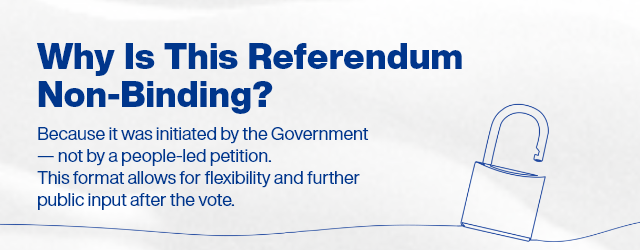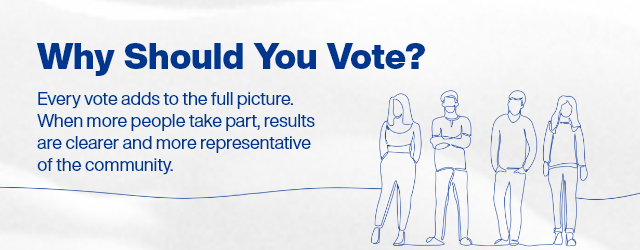The Vote That Guides: What Makes This Referendum Different?

The Vote That Guides:
What Makes This Referendum Different?
On General Election and Referendum Day — Wednesday, 30 April — voters in the Cayman Islands will have the opportunity to weigh in on three national questions:
- Should the Cayman Islands develop cruise berthing infrastructure?
- Do you support the introduction of a National Lottery in the Islands?
- Do you support the decriminalisation of the consumption and possession of small amounts of cannabis?
But before Cayman Islands voters head to the polls, it’s important to understand what this referendum is about, how it works, and why it’s happening now.

While a general election is used to choose representatives, referendums give voters the opportunity to express their views directly on key issues.
The upcoming referendum, initiated by the Cayman Islands Government, invites voters to share their views on three national topics and help shape future decisions. However, this referendum is non-binding, meaning the result will guide the Government but will not automatically lead to a change in law or policy.
A “yes” vote does not approve any past proposals or existing plans. It simply signals that the public believes the issue is worth exploring further.
What Does “Non-Binding” Mean?
In a binding referendum, the outcome legally requires the Government to act according to the majority vote. For example, if a binding referendum results in a “yes” majority, the Government must move forward with that decision..
A non-binding referendum works differently. It is advisory in nature — the results reflect public opinion, but they do not create a legal obligation. Instead, the outcome serves as valuable input that helps the Government understand the will of the people and shape decisions accordingly.
The results will be carefully reviewed by policymakers and may inform legislation, future consultations, or other forms of public decision-making.
Think of it as a compass rather than a command. It points in the direction the public wants to go, but it does not set the destination in stone.

This particular referendum is non-binding because it was initiated by the Government, rather than through a people-led petition process under the Constitution. According to the Cayman Islands Constitution Order 2009, a referendum triggered by a petition of at least 25% of registered voters is legally binding. In contrast, when a referendum is called by the Government, it does not carry the same legal requirement to act on the results.
While Government-initiated referendums are not automatically binding, the Government could have made this one binding by drafting the Referendum (Cruise Berthing Infrastructure, Gambling and Cannabis) Act, 2025 accordingly. In this case, it chose a non-binding format to allow for flexibility and further consultation after public input is received.
This approach allows leaders to consider a range of factors — including public opinion, legal advice, and economic impact — before making a final decision.
Why Is the Referendum Happening Now?
This referendum is being held in response to ongoing public interest and discussion around the three issues. The Government recognises that these matters have gained national attention and that many people have strong views.
Rather than making a unilateral decision, the Government chose to hold a referendum — offering a transparent and structured way for voters to share their views directly.
How Does the Process Work?
All registered voters will have the opportunity to cast their vote on Referendum Day. Leading up to the vote, official information is being shared through the Government’s referendum website, media releases, public meetings, and other communication channels to ensure voters have the facts they need to make an informed choice.
On the day of the referendum, voters will be presented with clear questions and given the choice to vote “yes” or “no.” Once the votes are counted, the official results will be released by the Elections Office and shared with the public.
Though the result will not be legally binding, it will provide a strong indication of public opinion. This is a key part of the democratic process — giving registered voters a direct voice in shaping the future of the Cayman Islands.

Think of it like making a group decision on where to go to dinner — if only a few people speak up, it’s hard to know what everyone truly wants. But if everyone shares their view, the decision becomes more balanced and well-informed.
By casting your vote, you help ensure that your voice is heard and that future policy development reflects the values and priorities of the community.
The Bottom Line
The upcoming referendum is an opportunity for registered voters to engage directly in the democratic process. While it is not legally binding, it carries significant weight as a reflection of public opinion.
You’ll be voting on cruise berthing, a national lottery, and cannabis decriminalisation — and your input matters on each.
Understanding the process, the reasons behind the timing, and the nature of a non-binding vote helps build trust and transparency. By participating, every eligible voter plays a role in shaping the conversation and influencing the future direction of the country.
Want to Dive Deeper Into the Issues?
Visit the official referendum website at www.gov.ky/referendum for information on each question, how the process works, and what to expect on polling day.
Whether you’re still forming your views or ready to cast your ballot, trusted resources are just a click away.
This is your voice. This is your vote. Use it.
Read More






